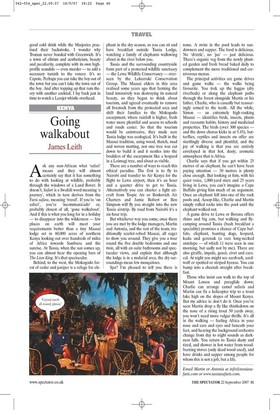Going walkabout
James Leith Ask any non-African what 'safari' means and they will almost certainly say that it has something to do with looking at wildlife, probably through the windows of a Land Rover. It doesn't. Safari is a Swahili word meaning 'a journey', which in turn derives from the Farsi safara, meaning 'travel'. If you're 'on safari', you're 'incommunicado' or, probably closest of all, 'gone walkabout'. And if this is what you long for in a holiday — to disappear into the wilderness — few places on earth will meet your requirements better than a tiny Maasai lodge set in 60,000 acres of northern Kenya looking out over hundreds of miles of Africa towards Samburu and the sunrise. At Tassia, when the sun comes up, you can almost hear the opening bars of The Lion King. It's that spectacular.
Behind, to the west, the Mokogodo forest of cedar and juniper is a refuge for elephant in the dry season, so you can sit and have breakfast outside Tassia Lodge, watching a family of elephants wallowing about in the river below you.
Tassia and the surrounding countryside form part of a protected wildlife sanctuary — the Lewa Wildlife Conservancy — overseen by the Lekurruki Conservation Group. The Maasai elders in this area realised some years ago that farming the land intensively was destroying its natural beauty, so they began to think about tourism, and agreed eventually to remove all livestock from the protected area and shift their families to the Mokogodo escarpment, where rainfall is higher, fresh water more plentiful and access to schools and roads easier. So that the tourism would be unintrusive, they made sure Tassia lodge was ecological. It's built in the Maasai tradition, using wood, thatch, mud and woven matting, not one tree was cut down to build it and it nestles into the boulders of the escarpment like a leopard in a Loimugi tree, and about as visible.
There are a number of ways to reach this ethical paradise. The first is to fly to Nairobi and transfer to Air Kenya for the flight to Lewa airport, then it's an hour and a quarter drive to get to Tassia. Alternatively you can charter a light aircraft from Tropic Air or Boskovich Air Charters and Jamie Robert or Ben Simpson will fly you straight into the new Tassia airstrip. By road from Nairobi it's a six-hour trip.
But whichever way you come, once there you are met by the lodge managers, Martin and Antonia, and the rest of the team, traditionally scarlet-robed Maasai, all eager to show you around. They give you a tour round the five double bedrooms and one twin, all with en suite bathrooms and spectacular views, and explain that although the lodge is in a malarial area, the dry surroundings mean few mosquitoes.
Spa? I'm pleased to tell you there is none. A swim in the pool leads to sundowners and supper. The food is delicious. No 'drizzle', no `jus' — just delicious. There's organic veg from the newly planted garden and fresh bread baked daily to complement the more traditional and carnivorous menus.
The principal activities are game drives and game walks — the walks being favourite. You trek up the luggas (dry riverbeds) or along the elephant paths through the forest alongside Martin or his father, Charlie, who is casually but reassuringly armed to the teeth. All the while, Simon — an extremely high-ranking Maasai — identifies birds, insects, plants and recounts habits, history and medicinal properties. The birds (over 300 species — and the dawn chorus kicks in at 5.45), butterflies, reptiles and insects on offer are startlingly diverse and plentiful, and the joy of walking is that you are entirely enveloped in that hot, dusty, aromatic atmosphere that is Africa.
Charlie says that if you get within 25 metres of an elephant, he can't have been paying attention — 30 metres is plenty close enough. But looking at him, with his quiet voice, 1,000-yard stare and 25 years living in Lewa, you can't imagine a Cape Buffalo giving him much of an argument. Once an elephant fell into one of the rock pools and, Aesop-like, Charlie and Martin simply rolled rocks into the pool until the elephant walked out.
A game drive to Lewa or Borana offers rhino and big cats, but walking and flycamping around Tassia (bush breakfast a speciality) promises a chance of Cape buffalo, elephant, hunting dogs, leopard, kudu and gerenuk (a rare long-necked antelope — of which 11 were seen in one morning, but sadly not by me). There are also giraffe, impala, genet, civet and caracal. At night you might see aardvark, aardwolf or spotted or striped hyenas. You can bump into a cheetah straight after breakfast.
Those who insist can walk to the top of Mount Lossos and paraglide down; Charlie can arrange camel safaris and Martin can fa a helicopter trip to a trout lake high on the slopes of Mount Kenya. But my advice is: don't do it. Once you've seen Martin drop a fly like thistledown on the nose of a rising trout 50 yards away, you won't need more vulgar thrills. It's all in the walking — feeling Africa in your nose and ears and eyes and beneath your feet, and hearing the background orchestra change from day to night sounds as darkness falls. You return to Tassia dusty and tired, and shower in hot water from woodburning stoves (only dead wood used), and have drinks and supper among people for whom this is not a job, but a life.
Email Martin or Antonia at info@tassiasafaris.com or www.tassiasafaris.com.

































































 Previous page
Previous page